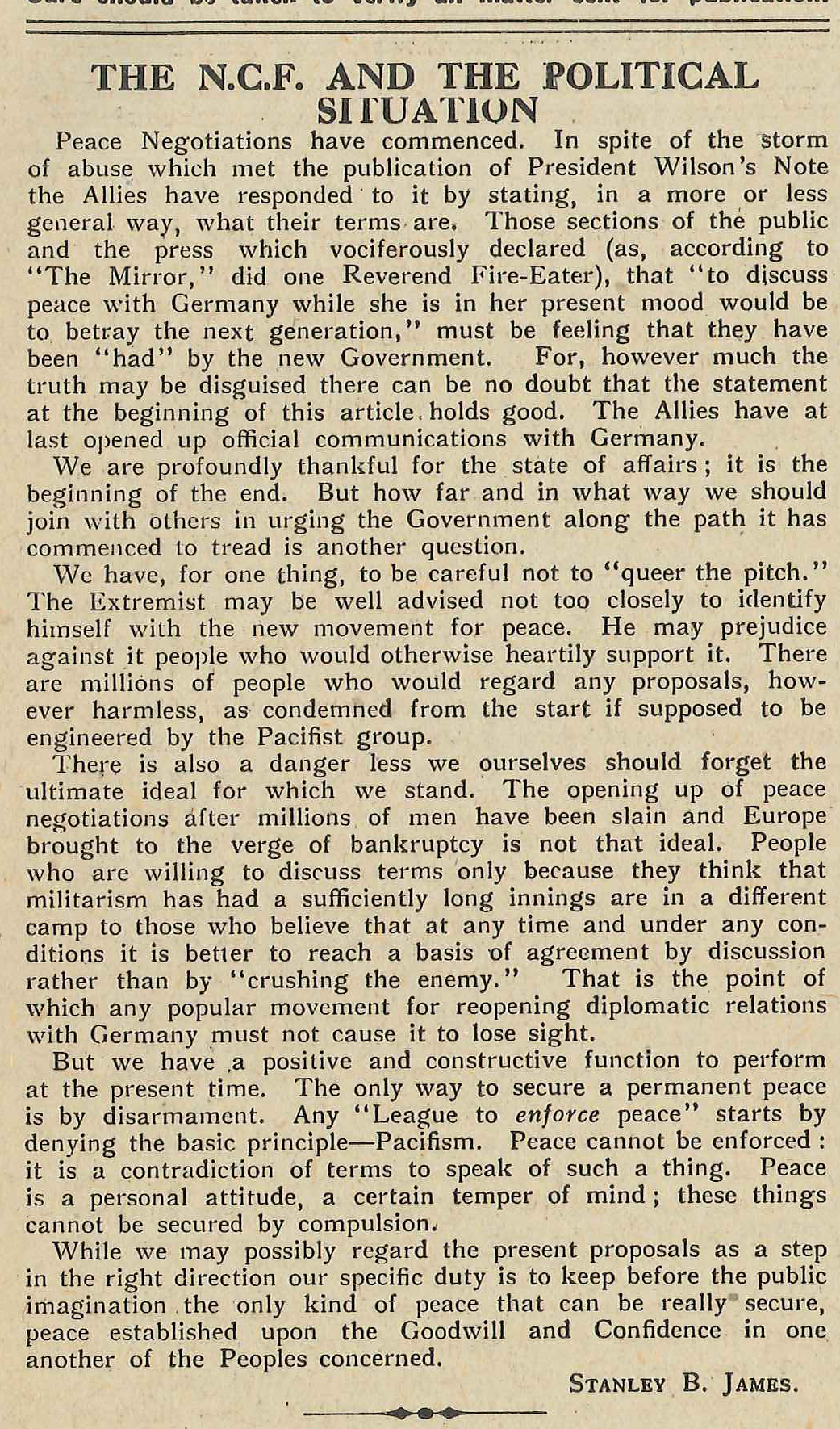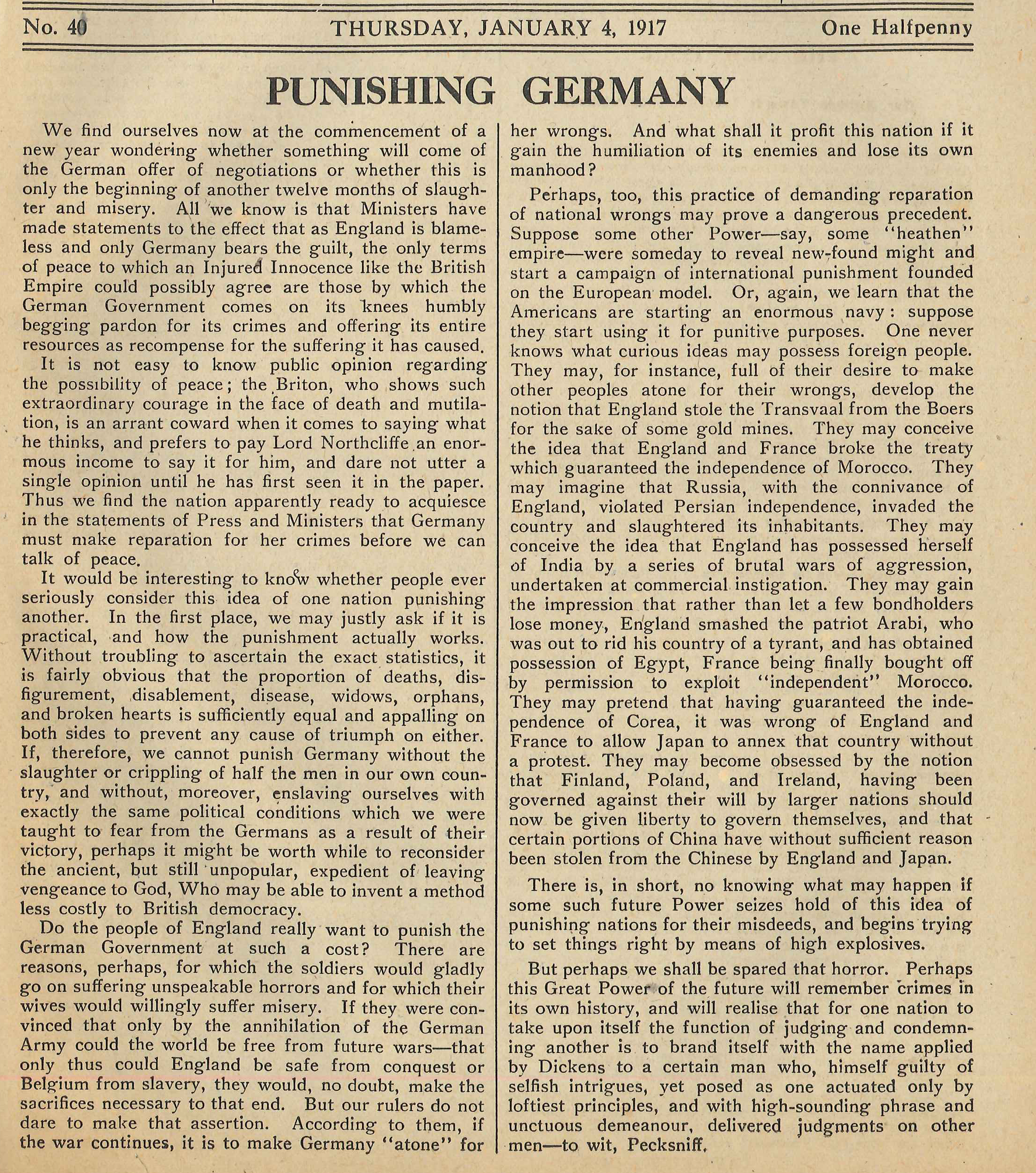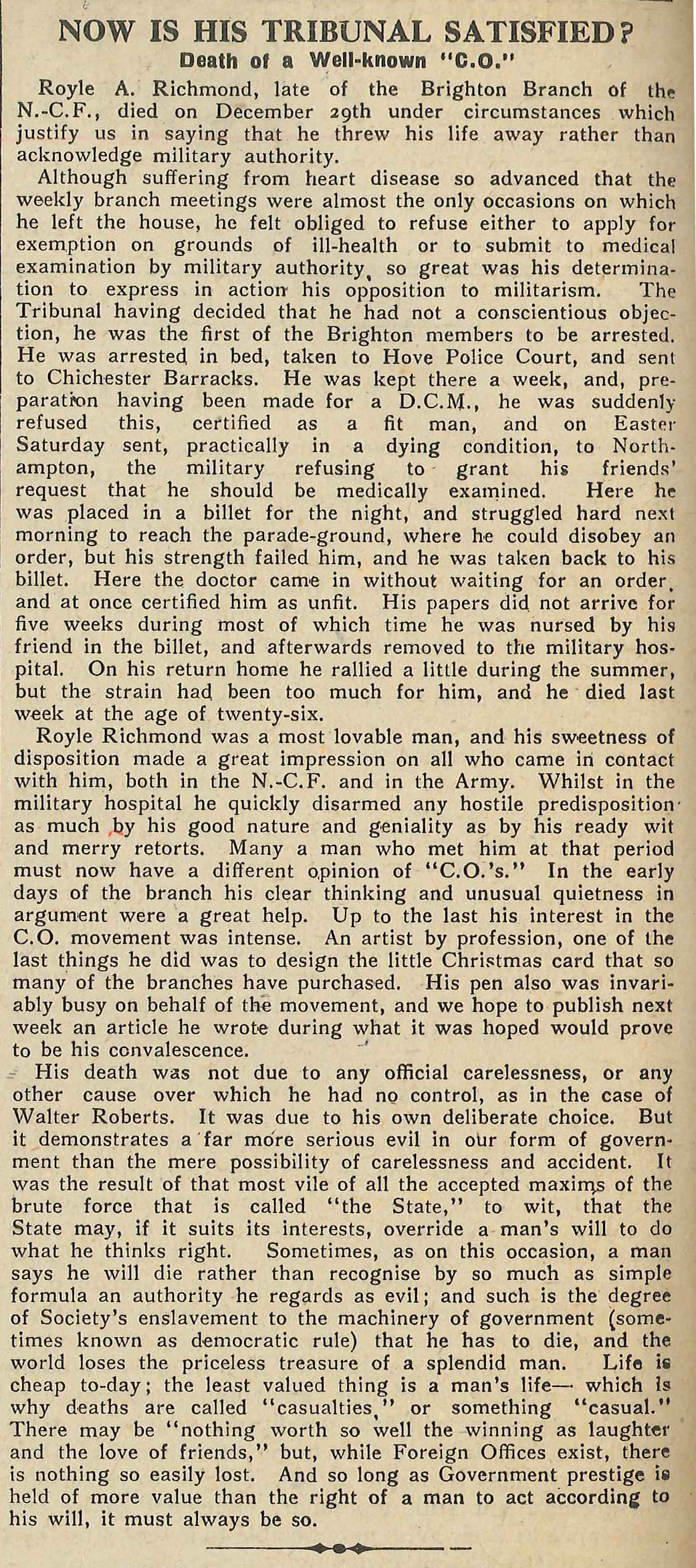
| HOME | TRIBUNAL HOME |
January 1917
January First 1917 did not dawn a Happy New Year. Another hope that the war would be over by Christmas had been dashed. The scale of the slaughter of French, British, Commonwealth and German men alike at Verdun and on the Somme had brought home to the last remaining households to realisation that mechanised modern war was pure and simple carnage. Too many households around the world faced a new year in the absence of fathers, sons, husbands and brothers.
The task facing the Tribunal had never been more pressing. With nearly a year’s experience of the effects and meaning of Conscription behind them, the editorial and writing staff of the No-Conscription Fellowship started the new year with a resolution - to keep up the struggle, but also to demolish the legal, ethical and moral framework justifying the war with ever more vigour.
The NCF and the Political Situation - 18th January 1917
Our first article for this month isn’t in the first issue but marks the New Years Resolution of the NCF, made after the National Convention earlier in the month. “The N.C.F and the Political Situation” outlines the actions and outlook of the NCF on early 1917’s most radical development - peace proposals. The idea of a negotiated peace had been tentatively discussed since September 1914, but with Woodrow Wilson’s peace overtures in mid-December 1916, the new year seemed to offer the best chance yet.
The NCF pounced on the proposals, proclaiming them “the beginning of the end”. While we know that peace would not only come much later but would come only with the crushing collapse of Germany, spurred on by optimism in those early weeks of 1917 this would have been impossible to contemplate.

The article shows both a commitment to a negotiated, fair peace, but also a remarkable degree of self awareness rare in a politically active newspaper of any kind. Instead of pushing peace proposals as hard as possible, the author Stanley James, provides words of caution. Acknowledging the near-pariah status of COs and their supporters, he suggests that “The Extremist may be well advised not too closely to identify with the new movement for peace”. A compromise must be made, as there were “millions of people who would regard any proposals, however harmless, as condemned from the start if supposed to be engineered by a pacifist group”. Sadly, still a familiar feeling.
Instead of despair though, James asks that the intellect of his readers be turned to scrutiny and analysis of the new proposals. Peace through negotiation in 1917 would have been won only after an “acceptable” amount of bloodshed - millions dead, perhaps, but honour surely defended, thus satisfying “people who are willing to discuss terms only because they think that militarism has had a sufficiently long innings”.
Peace, James assures, may be made by negotiation after war, but it is not a constructive and useful peace. Ending war is not equivalent to starting peace which is an ongoing process of changing relationships - “a personal attitude, a certain temper of mind”.
The optimism of the NCF in January 1917 was, as we know, misplaced. The peace proposals would fail, refused by both the Entente and Alliance and President Wilson himself was gearing up the United States for war.
Punishing Germany - 4th January 1917
In writing the NCF editorial above, James would almost certainly have been thinking about an article in the first January 1917 issue of the Tribunal - “Punishing Germany”. As with many other leading articles in the Tribunal it is unsigned and it’s author is unknown, though the dry and sarcastic tone sounds (at least to me) like Joan Beauchamp.
Whoever the author was, they had seen through the doublethink and fraudulent morality of a war to “punish Germany”. Starting off on an incendiary note by laying out the naked truth of British war aims, that since “England is blameless and only Germany bears the guilt” then the hoped for spoils would be Germany’s “entire resources as recompense for the suffering it has caused”, the article not only aims to attack an unjust and corrupt war, justified on a blatant falsehood but also - as so often in the pages of the Tribunal - shows a very accurate prediction of the eventual resolution of the war.
 But what does Punishing Germany really mean? How does one nation punish another? The article makes it clear by asking how many “deaths, disfigurement, disablement, disease, widows, orphans and broken hearts” were required to chastise Germany for her perceived crimes. Punishing a nation for political wrongdoing meant destroying the lives of those who had no part in the decision making process. Not only that, but it took the destruction of lives on both sides to achieve.
But what does Punishing Germany really mean? How does one nation punish another? The article makes it clear by asking how many “deaths, disfigurement, disablement, disease, widows, orphans and broken hearts” were required to chastise Germany for her perceived crimes. Punishing a nation for political wrongdoing meant destroying the lives of those who had no part in the decision making process. Not only that, but it took the destruction of lives on both sides to achieve.
What wrongs were being righted? Atrocity stories of German soldiers in Belgium (often fabricated) were popular in Britain, but, in a brilliantly sarcastic manner, the article lists the political perfidy of British foreign policy in the lead-up to the war - a refrain of land theft, oath and treaty breaking, “brutal wars of aggression”, empire, murder and destruction.
“Perhaps this... will prove a dangerous precedent” the article asks. “There is no knowing what might happen if some future power seizes hold of this idea of punishing nations for their misdeeds and begins trying to set things right by means of high explosives”. The Tribunal, though always capable of foreseeing 1918, could just as easily be talking about our contemporary “War on Terror” and it’s counter-war.
One of the major strengths of the Tribunal was it’s questioning of “common-sense” notions about the war. “Punishing Germany” is one of these notions. It’s one that is even accepted today, 100 years on, as a just and righteous action of a victorious nation over a defeated one. The same arguments made in this article stand as a critique of our own foreign policy today. How the world changes!
Death of Royle Richmond - 4th January
Though we will have covered the deaths of several COs in our monthly look at the Tribunal by the end of 1917, Royle Richmond’s death stands out for several reasons. Subtitled “Death of a Well Known CO”, it shows a man determined to refuse all war and militarism, to the point of throwing “his life away rather than acknowledge military authority”. Royle, though suffering from a serious heart condition refused to apply for exemption on any grounds other than conscience, and refused a medical examination when conscripted. Soon sent to prison, his health worsened and after being sent home, he died on the 20th of December 1916.
Royle’s obituary tells of a well liked and well known CO. But it also tells a more personal story. Lydia Sargent Smith, Royle’s fiancee, was one of the many women working for the NCF on the Tribunal at the time of his death. As an editor she would have been involved in the production and publication of the autobiography. Royle was a “most loveable man” with a “sweetness of disposition”. Even in a dedicated political journal the effects of war were still felt on a very close, very personal level.
A Song of More than Sixpence - 11th January
The Tribunal regularly printed contributions from it’s readers where they provided information, clarification or corrections. On other occasions, they would print something a little more light hearted...
